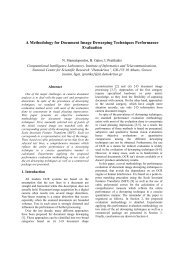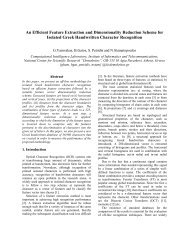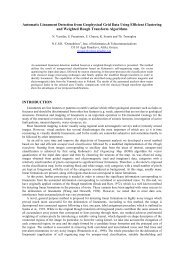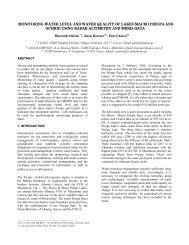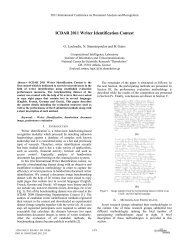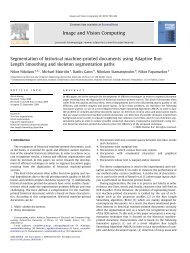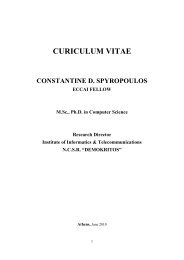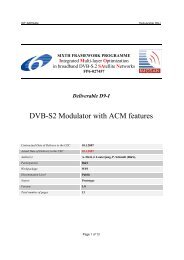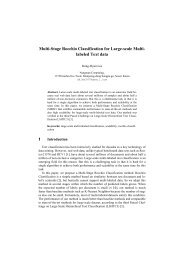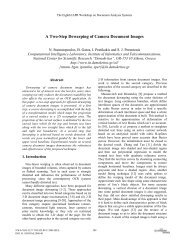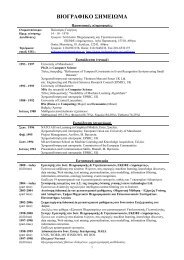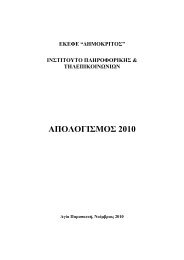TMS320C6713B Floating-Point Digital Signal Processor (Rev. A)
TMS320C6713B Floating-Point Digital Signal Processor (Rev. A)
TMS320C6713B Floating-Point Digital Signal Processor (Rev. A)
You also want an ePaper? Increase the reach of your titles
YUMPU automatically turns print PDFs into web optimized ePapers that Google loves.
DEVICE CONFIGURATIONS (CONTINUED)<br />
peripheral selection/device configurations via the DEVCFG control register<br />
SPRS294A − OCTOBER 2005 − REVISED NOVEMBER 2005<br />
The device configuration register (DEVCFG) allows the user to control the pin availability of the McBSP0,<br />
McBSP1, McASP0, I2C1, and Timer peripherals. The DEVCFG register also offers the user control of the EMIF<br />
input clock source and the timer output pins. For more detailed information on the DEVCFG register control bits,<br />
see Table 20 and Table 21.<br />
Table 20. Device Configuration Register (DEVCFG) [Address location: 0x019C0200 − 0x019C02FF]<br />
31 16<br />
Reserved†<br />
RW-0<br />
15 5 4 3 2 1 0<br />
Reserved† EKSRC TOUT1SEL TOUT0SEL MCBSP0DIS MCBSP1DIS<br />
Legend: R/W = Read/Write; -n = value after reset<br />
† Do not write non-zero values to these bit locations.<br />
RW-0 R/W-0 R/W-0 R/W-0 R/W-0 R/W-0<br />
Table 21. Device Configuration (DEVCFG) Register Selection Bit Descriptions<br />
BIT # NAME DESCRIPTION<br />
31:5 Reserved Reserved. Do not write non-zero values to these bit locations.<br />
4 EKSRC<br />
3 TOUT1SEL<br />
2 TOUT0SEL<br />
1 MCBSP0DIS<br />
0 MCBSP1DIS<br />
EMIF input clock source bit.<br />
Determines which clock signal is used as the EMIF input clock.<br />
0 = SYSCLK3 (from the clock generator) is the EMIF input clock source (default)<br />
1 = ECLKIN external pin is the EMIF input clock source<br />
Timer 1 output (TOUT1) pin function select bit.<br />
Selects the pin function of the TOUT1/AXR0[4] external pin independent of the rest of the peripheral<br />
selection bits in the DEVCFG register.<br />
0 = The pin functions as a Timer 1 output (TOUT1) pin (default)<br />
1 = The pin functions as the McASP0 transmit/receive data pin 4 (AXR0[4]).<br />
The Timer 1 module is still active.<br />
Timer 0 output (TOUT0) pin function select bit.<br />
Selects the pin function of the TOUT0/AXR0[2] external pin independent of the rest of the peripheral<br />
selection bits in the DEVCFG register.<br />
0 = The pin functions as a Timer 0 output (TOUT0) pin (default)<br />
1 = The pin functions as the McASP0 transmit/receive data pin 2 (AXR0[2]).<br />
The Timer 0 module is still active.<br />
Multichannel Buffered Serial Port 0 (McBSP0) disable bit.<br />
Selects whether McBSP0 or the McASP0 multiplexed peripheral pins are enabled or disabled.<br />
0 = McBSP0 peripheral pins are enabled, McASP0 peripheral pins (AHCLKR0, ACLKR0,<br />
ACLKX0, AXR0[0], AXR0[1], AFSR0, and AFSX0) are disabled (default).<br />
[If the McASP0 data pins are available, the McASP0 peripheral is functional for DIT<br />
mode only.]<br />
1 = McBSP0 peripheral pins are disabled, McASP0 peripheral pins (AHCLKR0, ACLKR0,<br />
ACLKX0, AXR0[0], AXR0[1], AFSR0, and AFSX0) are enabled.<br />
Multichannel Buffered Serial Port 1 (McBSP1) disable bit.<br />
Selects whether McBSP1 or I2C1 and McASP0 multiplexed peripheral pins are enabled or disabled.<br />
0 = McBSP1 peripheral pins are enabled, I2C1 peripheral pins (SCL1 and SDA1) and McASP0<br />
peripheral pins (AXR0[7:5] and AMUTE0) are disabled (default)<br />
1 = McBSP1 peripheral pins are disabled, I2C1 peripheral pins (SCL1 and SDA1) and McASP0<br />
peripheral pins (AXR0[7:5] and AMUTE0) are enabled.<br />
POST OFFICE BOX 1443 • HOUSTON, TEXAS 77251−1443<br />
35



